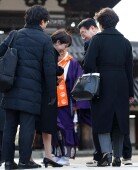[Opinion] Pansori To the World
[Opinion] Pansori To the World
Posted November. 10, 2003 23:13,
A kisaeng (an old Korean term for a mistress) named Maeng-yeol had a crush on a master singer, Song Heung-rok (1800~), for his wonderful Pansori (a traditional long epic song of Korea) and became his wife. One day, Mr. Song left home to practice his Pansori but did not come home after some 20 days so Maeng-yeol finally decided to leave him on the assumption that he cheated on her. Surprised, Mr. Song went down to the southern part of the nation, Jin-ju, to search for her, but instead he received an unexpected suggestion from the provincial army officer, Lee Kyung-ha. Mr. Song was asked to sing a part of the famous Pansori epic, Soo-gung-ga (translated as sea-palace song) for Mr. Lee, and if this song made Mr. Lee cry, he would be treated well, but if it did not, then he would be decapitated. The assignment was arranged by Maeng-yeol due to her hatred toward her husband. But the result was that he sang such a plaintive tune that all the soldiers there shed tears. It goes without saying that Mr. Song was awarded the grand prize and was successful in getting Maeng-yeol back as his wife.
The history of Pansori only goes back some 200 years, but Pansori saw a rapid development with the appearance of legendary master singers such as Mr. Song in the above story. These singers could make an audience cry and laugh. They also performed their songs in front of kings, and Songs colleague, singer Mo Heung-gap, received the second-highest official ranking. Mr. Song himself was also posted to one of the grandest official positions by King Chul-jong. Considering that it was almost impossible to imagine a mere entertainer receiving a high official position at that time, such occasions were very unusual. This must show that the kings were also impressed with their singing.
It makes sense that they made a lot of money. High officials and noblemen scrambled to have master singers perform Pansori in front of them. They were just like the star singers of today. Back then, noblemen had to possess such artistic skills as writing poetry and drawing paintings as a basic qualification for their class. Such keen interest in cultural richness might have been a great strength to nurture our traditional epic song, Pansori. Pansori singers made their greatest efforts to be recognized. Singers who just mimicked their teachers were not praised. They had to continue to make efforts to be recognized as a creative artist. Actually, the success of todays cultural industry would be guaranteed if these two factors were in place.
It is good to hear that Pansori became one of the worlds intangible cultural assets selected by UNESCO. Pansori has very special features different from western singing. It is well-received among critics for its unique delivery of the Korean soul. That might have come from the unfathomably deep rancor and sentiments of lower classes in the past. It is a pity that less and less people appreciate Pansori these days. Without many supporters, how can Pansori continue to grow? We should pay more attention to the spreading of Pansori by having more people enjoy it.
Written by Hong Chan-sik chansik@donga.com






![[단독]정부, 석유화학 이어 배터리 구조조정 시사](https://dimg.donga.com/c/138/175/90/1/wps/NEWS/IMAGE/2026/01/15/133159957.1.jpg)
